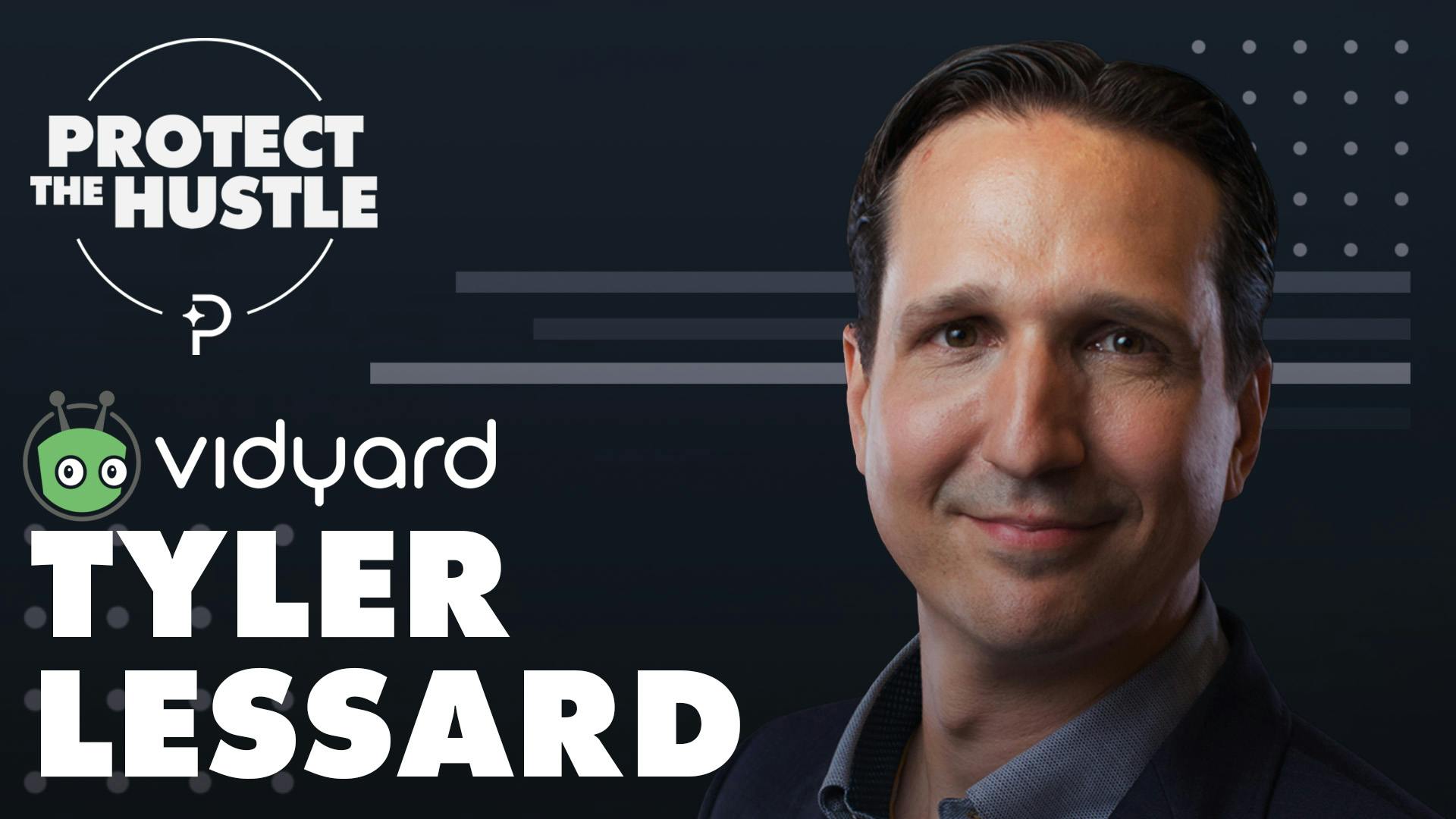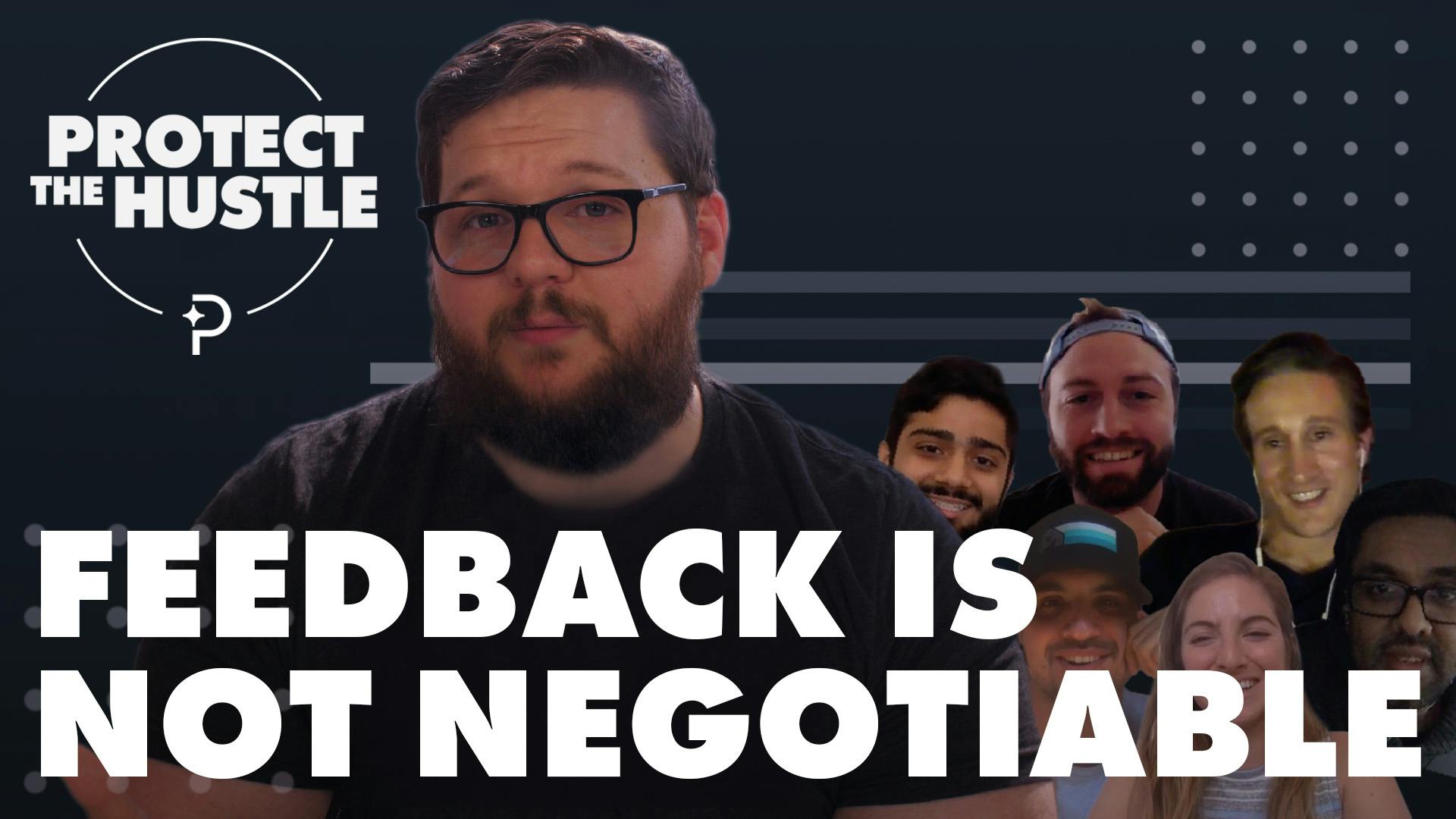
Scale Globally: How to Internationalize with Lucas Lovell
This episode is a preview of an in depth resource we have that gives you even more data about internationalization. Sign up right now and don't be left behind.
Internationalization is great... but you've got it all wrong
There are SaaS markets out there that have growth rates up to 30% more than the one you’re in right now. These are areas that will diversify your revenue streams and unlock new growth opportunities... domains that make it possible to avoid being reliant on a single region which is especially prudent in times of economic uncertainty.
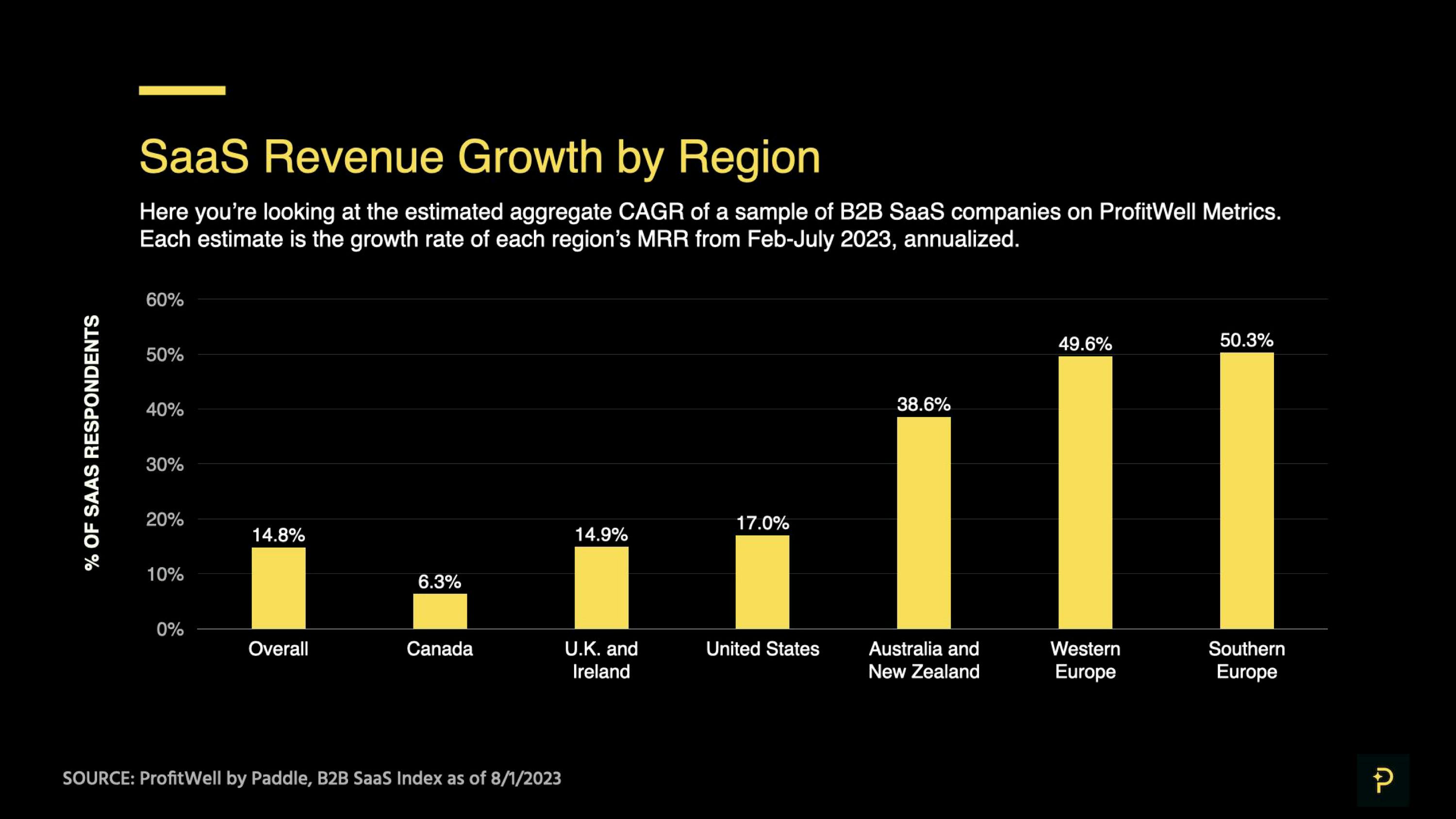
For folks that are looking to scale, this isn’t a mysterious growth hack for you to adopt. I’m not here to tell you that this is easy, but it’s an entire strategy that can transform small businesses into enterprise behemoths. You clicked on this link, it’s not a secret that I’m speaking of Internationalization, but it can’t be understated how crucial it is to get it right and how most of you aren’t even doing the bare minimum.
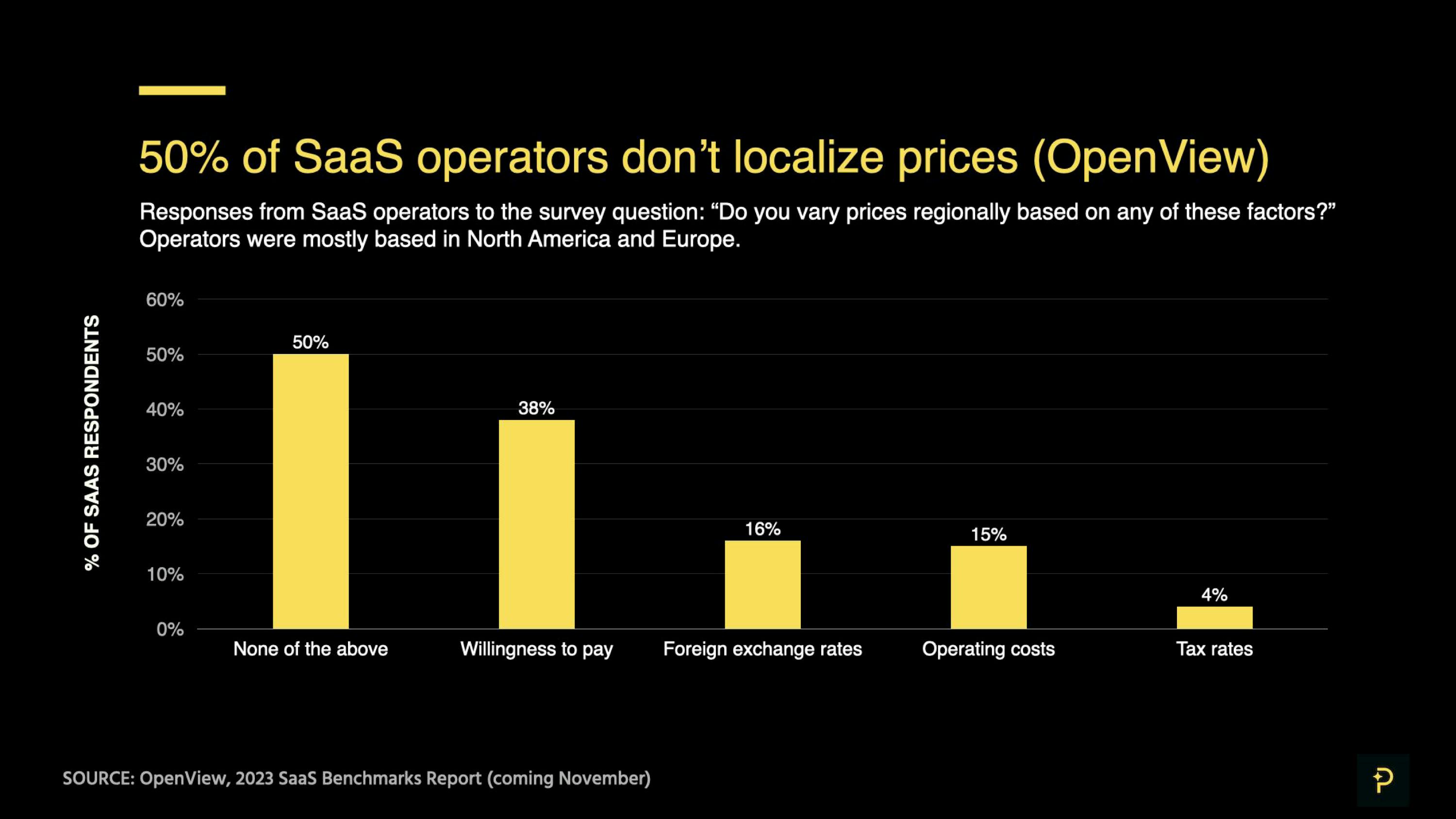
In a survey of over 700 SaaS operators, we found that half don’t even localize their prices. Which is absurd because customers in different regions will pay you more for the exact same product. But honestly, I’m not qualified to tell you what to do. I haven’t walked the walk, I’m just decent at talking the talk. You need someone who has actually been there before. Someone who has sold on multiple continents. You need someone like Lucas Lovell.
Who is Lucas Lovell?
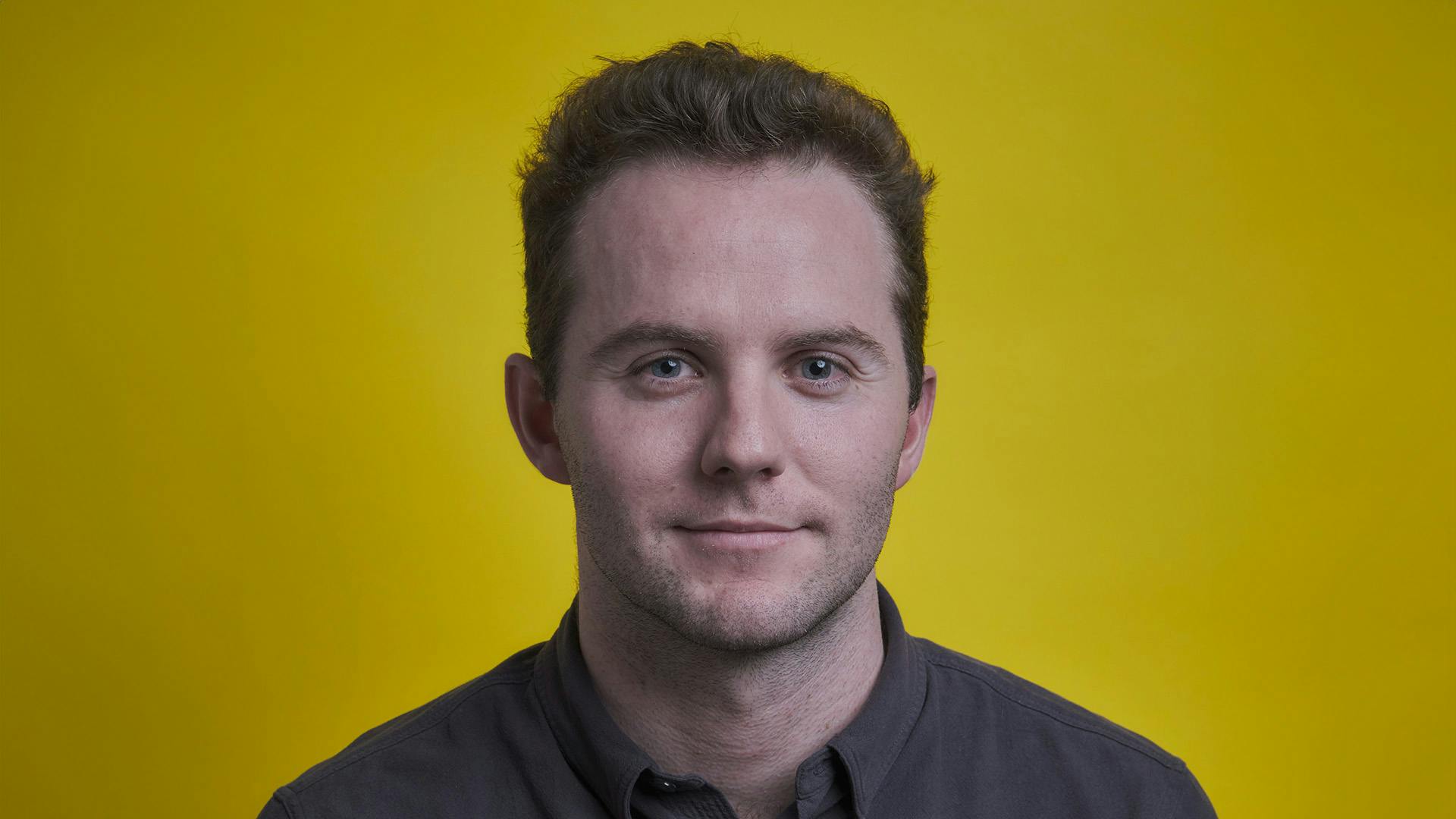
Lucas has operated a SaaS business in two different hemispheres, first in his native Australia and then in France. Now, he’s the Director of Product at Paddle where he is located in the UK and takes care of customers all around the globe. As you’ll hear in the interview, Lucas’ authority isn’t defined by racking up successes in a new market, rather it’s proven through the stumbles he experienced along the way.
Skip the learning curve of internationalization as we learn about the personalization that will take you to the next level.
Recession Armor
Lucas Lovell's venture from Australia to France embodies the trials and revelations of taking a startup international. The allure of internationalization lies not only in its potential for business scalability but also in the diversification and resilience it offers against regional economic fluctuations. The opportunity to scale is significantly enhanced when businesses can operate in markets that are not simultaneously affected by the same economic downturns. This perspective underscores the strategic advantage of geographic diversification, offering businesses a form of "armor" against localized recessions.
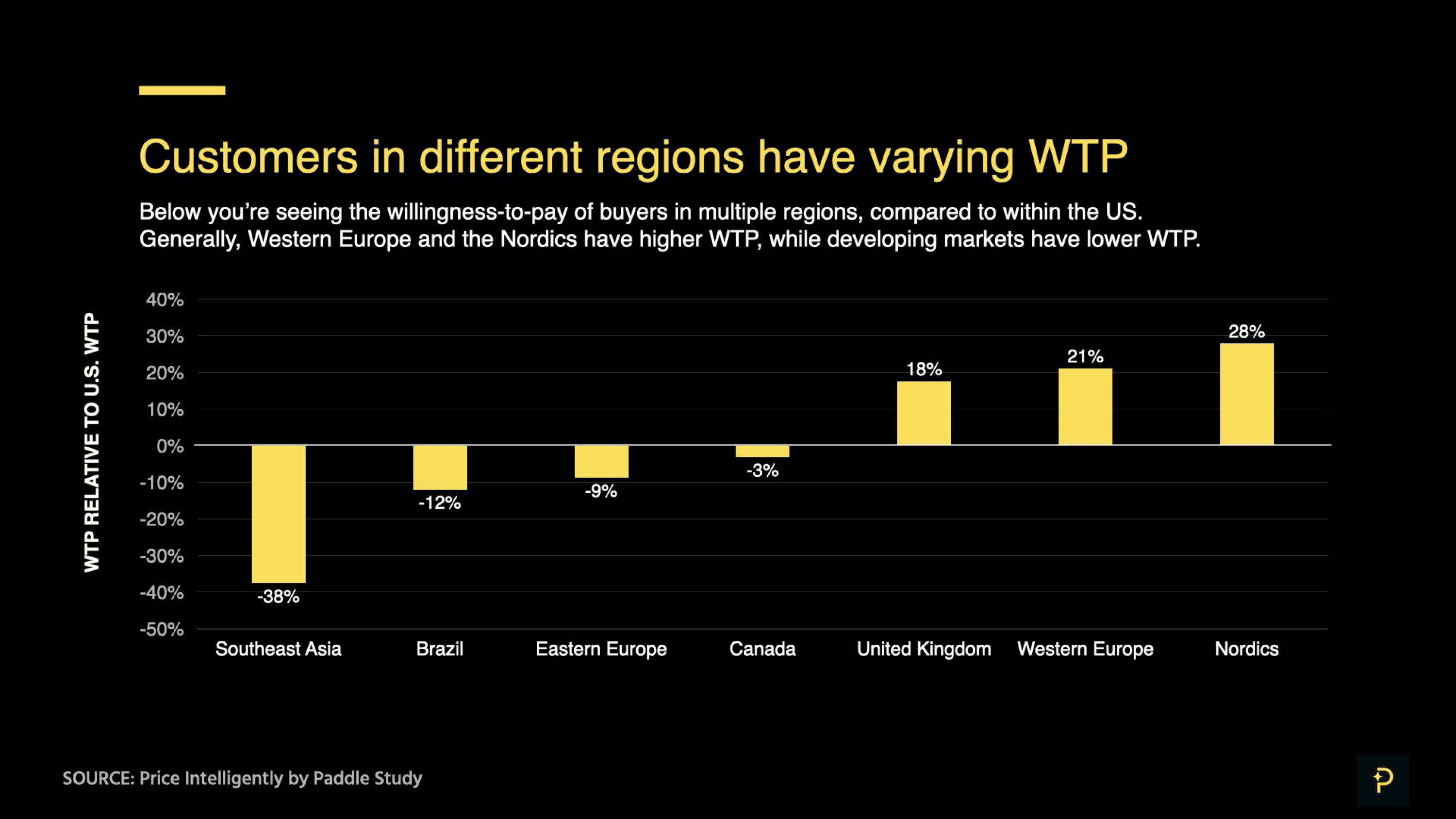
Furthermore, different regions exhibit varying levels of willingness to pay, with the Nordics, for example, demonstrating a willingness to pay nearly 30% more than consumers in the United States. This disparity in pricing tolerance presents a unique opportunity for businesses to capitalize on higher price points for the same product, thereby increasing their revenue potential without incurring additional costs.
Lucas's experience reflects this strategic approach to international expansion, emphasizing not just the potential for higher revenue through increased pricing flexibility but also the importance of market size. The decision to move his business to France was driven by the vast difference in market size compared to Australia, aiming to tap into a significantly larger pool of potential customers in the tourism industry, one of France's economic strongholds.
Shouldn't I be able to sell anywhere?
There is a common misconception that the global reach of the internet and SaaS platforms naturally translates into the ability to sell to anyone, anywhere, without additional strategic efforts. There is a crucial difference between having a product that can theoretically be accessed globally and creating a system that facilitates and encourages purchases across diverse markets. Key components of this system include currency localization, language adaptation, and payment method diversification, all aimed at resonating with local preferences and norms.
For instance, the importance of presenting prices in the local currency and tailoring the buying experience to the native language of the consumer, noting that a significant majority of consumers are more likely to make a purchase if the information is presented in their native language. This extends beyond simple translations to encompass all marketing materials, contracts, and terms and conditions.
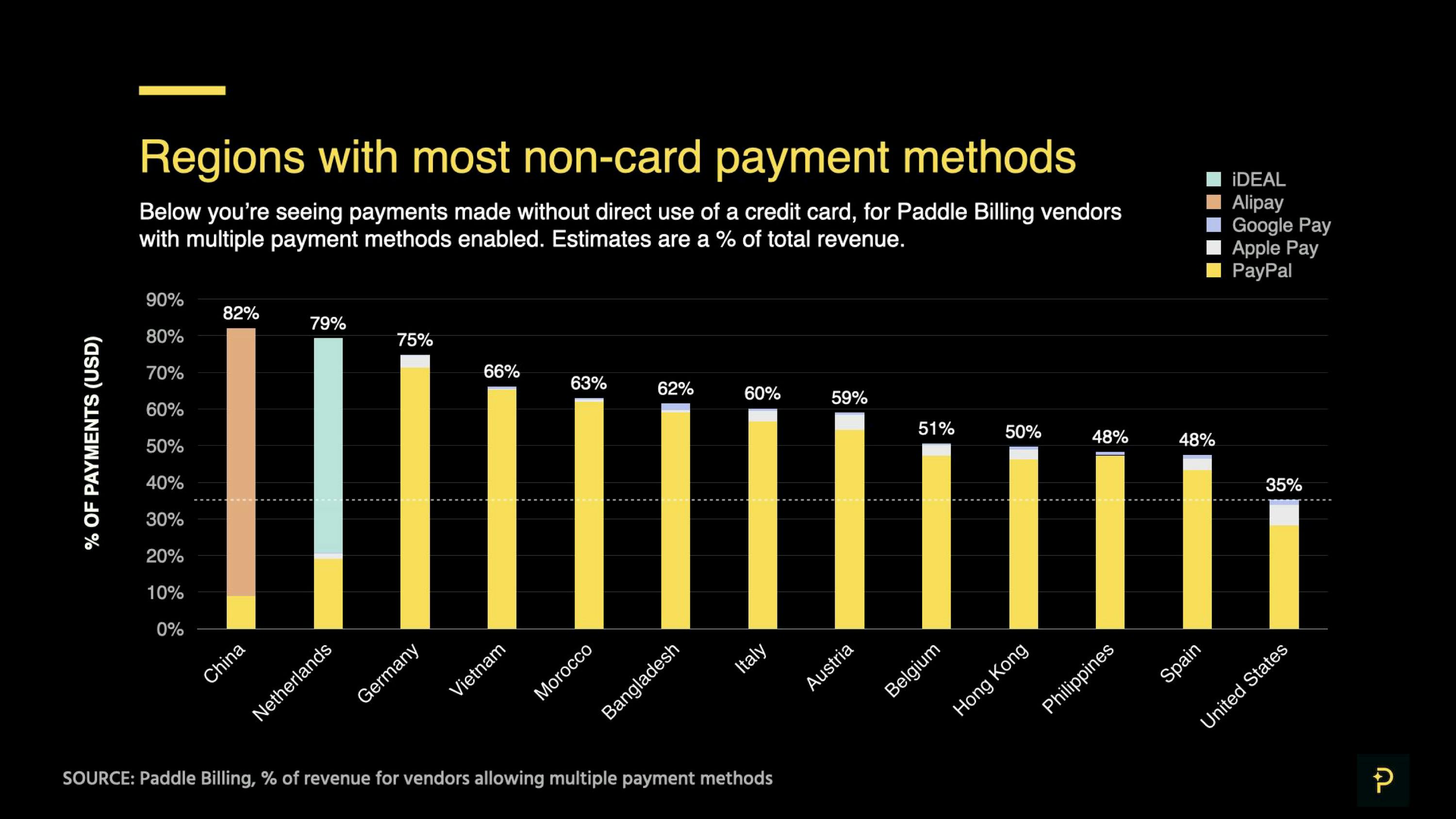
Payment method localization is another critical factor, challenging the assumption that credit cards are universally preferred. Many regions favor local payment methods over traditional cards, necessitating adaptation to local payment ecosystems. Furthermore, pricing strategies can be adjusted based on regional willingness to pay, potentially enhancing revenue in markets with higher pricing tolerance.
However, this isn't simple. Some companies mistakenly maintain a one-size-fits-all approach, charging uniform prices in US dollars across all markets without considering localization. He advocates for a robust international sales strategy that includes operational readiness, market-specific go-to-market approaches, and an understanding of local buyer characteristics.
Understanding cultural differences pays off
When Lucas first started selling in Europe, he learned that German consumers have heightened data privacy concerns compared to other regions. To effectively cater to a market with heightened sensitivity to data privacy, Lovell suggests several actionable steps:
- Enhance Website Transparency: Make data policies and privacy practices more prominent on the company website. This could involve highlighting these policies on landing pages or other visible sections to reassure visitors of the company's commitment to data protection.
- Revise Contracts and Policies: Bring data protection policies to the forefront of contracts, terms and conditions, and privacy policies. By making these documents clearer and more accessible, companies can demonstrate their seriousness about handling customer data responsibly.
- Communicate Early in the Sales Process: For sales-led approaches where direct interaction with potential customers occurs, Lovell recommends addressing the company's data policy early in the conversation. This preemptive reassurance can help mitigate concerns and build trust with prospects who prioritize data privacy.
This isn't a catch-all strategy for every market, but by implementing tactics like these in Germany, Lucas was able to better align their offerings with the specific needs and concerns of their target markets, thereby enhancing customer trust and improving conversion rates. Lucas' advice underscores the importance of not only recognizing but also proactively addressing the unique preferences and requirements of each market to achieve success in international sales.
Don't lose millions like Starbucks: understand your market
Starbucks' expansion into Australia serves as a cautionary tale about the importance of market localization and understanding local consumer preferences. The American coffee giant struggled to resonate with Australian customers. This misalignment in understanding and catering to local tastes led to Starbucks' loss in over $100,000,000 USD and the closing of half of their stores.
Starbucks' failure in Australia, according to Lucas, who is himself Australian, primarily stemmed from a misreading of the market and not adapting to the unique Australian coffee culture that values quality, enjoyment, and social interaction over the convenience of grab-and-go coffee. This experience contrasts with the company's later adjustments and successes in other markets by tailoring their approach to match local expectations.
Lovell draws a parallel between Starbucks' experience and the challenges software companies face when expanding internationally. He emphasizes that the success of a product in a new market depends on understanding and adapting to the characteristics and traits of both the buyers and the environment, including factors such as currency, language, laws, and regulations. The conversation underscores that a one-size-fits-all approach fails to acknowledge the unique preferences and requirements of different markets.
Furthermore, Lovell points out that many software companies make the mistake of selling globally without localizing their pricing or product offerings, essentially limiting their potential for success. He argues that just as selling coffee in Australia in US dollars would be absurd, so is the practice of selling software without considering local currencies and cultural nuances. This approach not only restricts a company's market penetration but also its overall growth potential.
We made a whole video that dives into this topic. Check it out here.

Regional focus on the big 3: Acquisition, Monetization, Retention
For successful expansion, companies should deeply consider how they will adapt their strategies to effectively acquire new customers, monetize them according to the new market's characteristics, and retain them through superior support and product adaptation. This approach requires a cross-functional team that understands the product's readiness, the go-to-market strategy, and the operational setup necessary for legal compliance and market relevance. The key functions of your business need to be represented in such a team:
- Product Management: Ensures the product is adapted and resonates with the target audience, including language localization and cultural relevance.
- Customer Support: Prepares to support customers in the new market, potentially requiring language skills and understanding of local customer service expectations.
- Marketing: Adapts go-to-market strategies to align with the buying dynamics and consumer behaviors of the target country.
- Sales: Adjusts sales approaches and tactics to fit the new market, taking into account local business practices and preferences.
- Legal: Addresses legal considerations for operating in the new market, including compliance with local laws and regulations, and the potential need for local establishment.
This approach ensures that all critical aspects of international expansion, from product adaptation to legal compliance, are considered and managed by experts from each relevant function, facilitating a more coherent and effective entry into new markets.
Don't complicate it: have a tiered approach
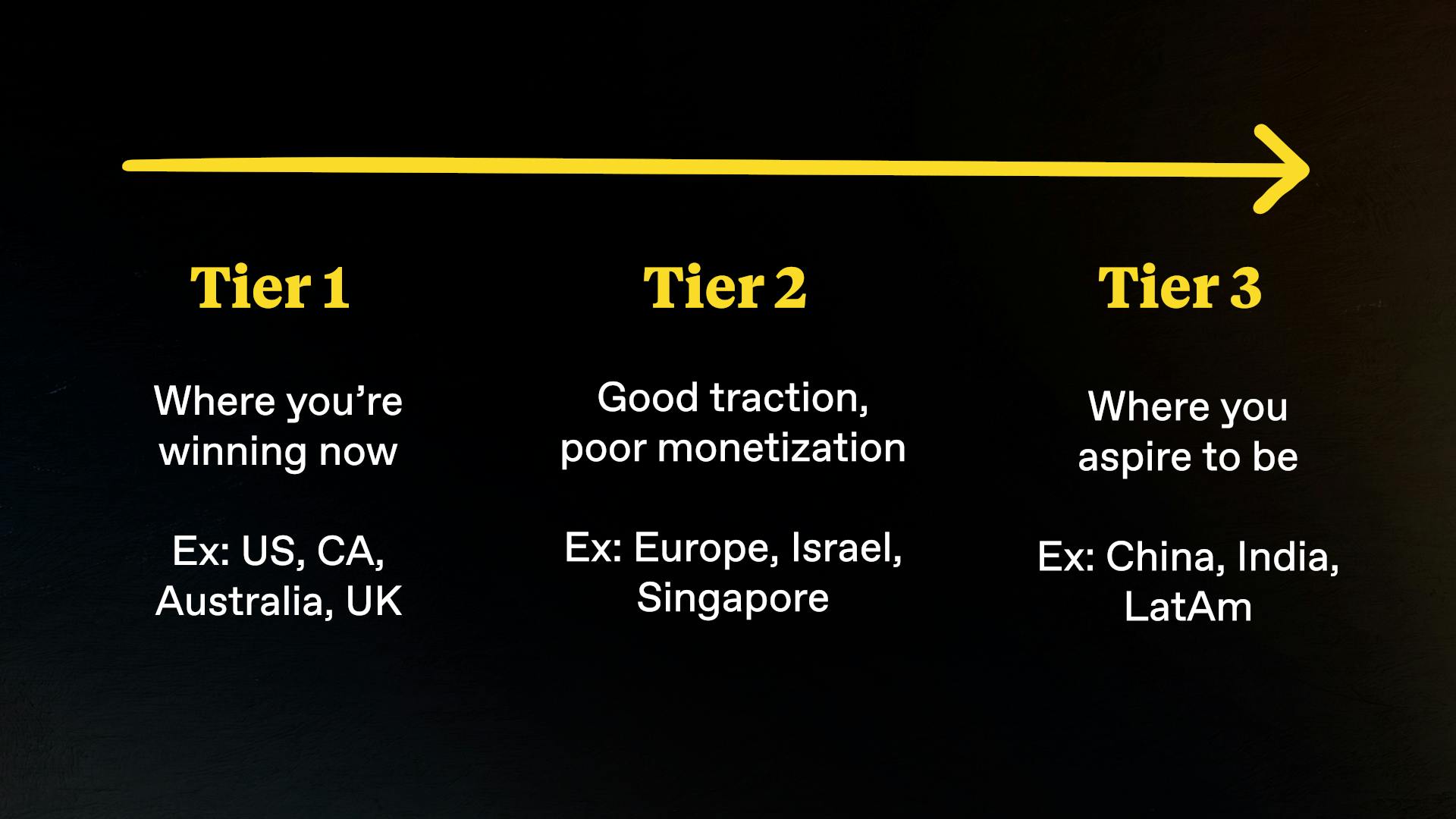
When planning for international expansion and using this tiered approach, you can categorize potential markets into three tiers based on their likelihood of success and the challenges they may face:
- Tier 1: High Potential Markets
undefined - Tier 2: Viable Opportunities with Challenges
undefined - Tier 3: Challenging Markets for Future Consideration
undefined
This tiered approach helps you prioritize international expansion efforts systematically, focusing first on markets with the highest potential for success and gradually addressing more challenging environments as they build their global presence and capabilities.
Internationalization is a strategy, Localization is the execution
Localization goes beyond adapting currencies and languages; it's about demonstrating to customers that a business is genuinely invested in catering to their specific needs and preferences. This commitment can significantly transform customer relationships and dynamics, as Lovell personally experienced in France. The effort to communicate in the local language and adapt to local business practices, even in small ways, can have a substantial impact on customer perceptions and the success of the expansion effort.
Do not daunted by the complexities of internationalization. Embrace the opportunity for growth it represents. While there's a "proceed with caution" aspect due to the various challenges and "gotchas," the potential benefits for the business and personal growth from discovering new cultures and ways of doing business are immense.
"Localization is sending a really powerful message to your customers that you care about them."
- Lucas Lovell
For those seeking further advice or information, you can email Lucas at lucas.lovell@paddle.com or find him on Twitter or LinkedIn.
Thirsting for more on internationalization? Sign up for our internationalization resource right now and don't be left behind.
00:00:00:05 - 00:00:23:06
Ben Hillman
There are SaaS markets out there that have growth rates up to 30% more than the one that you're in right now. Now you clicked on this link. You of course know that I'm speaking of internationalization. Most of you aren't even doing the bare minimum. In a survey of over 700 SaaS operators. We found that half don't even localize their prices, which is absurd because customers in different regions will pay you more for the exact same product.
00:00:23:07 - 00:00:36:12
Ben Hillman
But honestly, I'm not qualified to tell you what to do. I mean, as you can tell, I'm reading off a teleprompter right now. You need someone who's actually been there before. Someone who is sold on multiple continents. You need someone like Lucas Lovell.
00:00:36:15 - 00:00:40:07
Lucas Lovell
My name is Lucas, and I am director of product here at Paddle.
00:00:40:09 - 00:01:01:19
Ben Hillman
Lucas has operated a SaaS business in two different hemispheres, first in his native Australia and then in France. Now he's the director of Product Paddle, where he's located in the UK and takes care of customers all around the globe. As you'll hear in the interview, Lucas's authority isn't defined by racking up successes in a new market. Rather, it's proven through the stumbles he experienced along the way.
00:01:01:19 - 00:01:11:02
Lucas Lovell
We got dealt a pretty brutal reality. We hadn't localized all of our contracts and our content. There were a lot of things on the acquisition front that we needed to change.
00:01:11:03 - 00:01:16:15
Ben Hillman
Skip the learning curve of internationalization. As we learn about the personalization that will take you to the next level.
00:01:16:19 - 00:01:23:02
Lucas Lovell
Localization is sending a really powerful message to your customers that you care about them.
00:01:23:06 - 00:01:29:03
Ben Hillman
My name is Ben Hillman, and let's Protect the Hustle.
00:01:29:05 - 00:01:43:04
Ben Hillman
Welcome, folks. Back to protect the hustle. I have got with me here, Lucas Lovell. Why don't you give us a bit of your background? Our our topic today is around internationalization. And you're a man of many countries yourself. Is that correct?
00:01:43:04 - 00:02:05:23
Lucas Lovell
Indeed. I think you probably could say that, as you can probably tell by the accent. I'm originally from Australia. Lived in Australia for 24 or 25 years. Went to school in university in Australia, studied law in Australia of all things law in international relations, which is not a path I ended up going down, I guess, which is why we're here talking today about software and technology.
00:02:05:23 - 00:02:27:20
Lucas Lovell
I went into tech by founding starting my own company. So I started my own company straight out of law school back in Australia. That was the 2016 time. 2015, 2016. And I ran that company in Australia for a couple of years and then relocated that business over to France. And we ran the business in Paris for a period of four years, which was a ton of fun.
00:02:27:20 - 00:02:50:11
Lucas Lovell
I had a great time. We were part of a bunch of acceleration and incubation programs for early stage startups. We grew the business, in France over a number of years, and then more recently I've joined Paddle in the product team, the business that I did run. We ran into some pretty fierce difficulties during Covid. We were a SaaS platform, a software product that we sold to tourism companies.
00:02:50:11 - 00:03:14:17
Lucas Lovell
We sold to lots of tourism companies across most of Europe and Australia, in the US and Canada. And we hit some roadblocks, to say the least. Throughout the course of Covid, when people stopped traveling, we attempted to pivot the business a couple of times, and ended up realizing that the opportunity was probably running dry for us, at which point I moved over from Paris to London to join Paddle where I'm very happy, to work at right now.
00:03:14:18 - 00:03:32:01
Ben Hillman
Australia, France, London. Now, there's maybe some assumptions that folks make about the differences between each of those regions. What do you think was the most surprising thing when you arrived in France that you didn't expect about doing business there versus your home in Australia?
00:03:32:02 - 00:03:55:17
Lucas Lovell
I think the first thing I would say is that we were very new to business at the time, and we were quite naive in our expectations. We sort of thought that we'd been given this wonderful opportunity, and that would just mean world domination and the fact that we were taking a company from Australia, where we had customers in Australia to France was was sort of like a big opportunity that would work itself out for us.
00:03:55:17 - 00:04:13:22
Lucas Lovell
And I think the first definitely the first 1 or 2 years in France, we we got dealt a pretty brutal reality ride and that was that doing business in France is very different to doing business in Australia. The fundamentals of business at the same. Right. You make an amazing product and you sell it to a market that has a deep need for that product.
00:04:13:22 - 00:04:41:10
Lucas Lovell
But the way in which you do that and how you operate as a business needs to change quite substantially, in order to succeed in a foreign market. Now, to what extent it has to differ? Definitely varies. Yeah. So I think for an Australian company, most lots of Australian companies will use the UK as their entry into the European market because it's typically an easy a place to land culturally, operationally.
00:04:41:12 - 00:04:59:00
Lucas Lovell
A lot of things about doing business in the UK and Australia are quite similar. We didn't go to the UK, we went to France and France is a lot more challenging and a lot more different. So I think we see those sort of trends everywhere, right where where companies will try and internationalize or move across the world, and, and, and go about that in different ways.
00:04:59:00 - 00:05:16:17
Ben Hillman
Was there anything when you showed up in France that you were like, oh, we're going to do great in this specific area, whether it's acquisition is going to be easier or maybe advertising is going to be better something or was there something that, you thought was going to be getting like gangbusters? And then it turned out to be you were completely wrong.
00:05:16:18 - 00:05:38:03
Lucas Lovell
I don't think we expected anything to be gangbusters, to be honest. I think we did realize that there were a lot of things on the acquisition front that we needed to change in order to be successful in France. I think coming from an English speaking country, there's there's a bit of an assumption that the world just plays by your rules, to be honest with you.
00:05:38:05 - 00:06:10:08
Lucas Lovell
And and so we hadn't localized all of our contracts and our content into French. And that I created a few difficulties in terms of trying to acquire those, those, those few customers. So that was definitely a learning experience. But I don't think there was anything that we thought was going to be a unique opportunity because we were foreign, apart from the fact that maybe we thought it was a bit cool and sexy to be French and being operated like operating in that like startup ecosystem, especially at a time when the French startup ecosystem was really trying to internationalize and become more global.
00:06:10:08 - 00:06:38:23
Ben Hillman
And we know that one of the exciting prospects of internationalization and is it really is this opportunity to scale. And it gives you there's I mean, if you think about it, too, if there's a recession in Australia, for example, that maybe isn't affecting Europe, there's a massive opportunity there to have a little bit of armor and and durability in your business because you're able to expand to a place where they are still growing at a at a good rate.
00:06:38:23 - 00:07:01:18
Ben Hillman
I mean, we know from our we have some data from last year that will of course link in the description and maybe even show on the screen. There's different regions have different willingness to pay. I mean compared to the US, that the Nordics, for example, are willing to pay nearly 30% more than folks in the United States. And yes, the Nordics is a smaller region than all of Europe versus all the rest of the world and everything like that.
00:07:01:18 - 00:07:14:23
Ben Hillman
But I see why there is this great opportunity to expand elsewhere, where it's like you're basically selling the same product, but people are going to pay you more for that. Yeah. What makes that so that's an alarming stat. No it.
00:07:14:23 - 00:07:39:11
Lucas Lovell
Is. Willingness to pay is one thing. The other thing that makes it a really exciting business opportunity is market size. Right. And that was the thing that initially drew us to France. Just to sort of relate that back to the experience was like, we're in Australia, which is a country of 20 to 23 million people, with a medium sized tourism industry going to a juggernaut of the tourism industry, one of the most visited countries in the world, right.
00:07:39:11 - 00:07:58:01
Lucas Lovell
Where the market size was, we estimated at ten what it was in Australia. Right. So so I think the lure for us was was not so much around, like, okay, we think our business like we think we can monetize our customers better in France, i.e. they'll pay more, but rather there were probably just more customers for us to acquire.
00:07:58:03 - 00:08:22:22
Lucas Lovell
And so our opportunity to grow as a business is bigger by expanding internationally. I think for most companies, that's probably the impetus for the ever expanding internationally. But to your point, right, that it does create other opportunities as well, right, in terms of being able to leverage a higher willingness to pay in different countries. Right. being able to sell the same product at a higher price point but at the same cost to you as a business.
00:08:23:00 - 00:08:34:06
Lucas Lovell
So that's definitely a thing. and I think a lot of the concept of adjusting pricing and adapting your business based on willingness to pay is something that is typically overlooked by a lot of software companies, especially.
00:08:34:06 - 00:09:09:14
Ben Hillman
The last thing I want I want to harp on, from the opportunity perspective as well, is that I know from the US perspective that we're we're pretty selfish. We kind of only think of as the US economy is the important economy and and expand and scaling and growing in the US is important. And so maybe not thinking about the opportunity that is in our in other regions, which when you look at again, referencing the data that we gathered us at some point last year, that SaaS revenue growth by region is also loads bigger in different regions.
00:09:09:14 - 00:09:35:05
Ben Hillman
When you look at something like compound annual growth rate, it's 30 points higher in Europe than in the United States, Australia, New Zealand, for example, are also 20 points higher. And I know you touched on this yourself, but just kind of driving that point home of speaking the same language here for the most part, especially in Australia, New Zealand, it's there's a tantalizing oh, that's a great opportunity.
00:09:35:05 - 00:09:48:16
Ben Hillman
And it sounds like where a lot of people get wrong is it's not just about changing your prices to, to be the same thing as they are in those regions or at the same currency, if you will. It's a fundamental strategy that you kind of need to adopt.
00:09:48:16 - 00:10:10:14
Lucas Lovell
I think you're coming around like it's a tantalizing thing for a business, especially like a business that is perhaps a bit younger is a really good way to put it. And it's funny actually, because instinctively people in the US don't go, I need a bigger market, right? The US market is substantial. People in Australia who are very ambitious, instinctively they go, I need to be a market, right?
00:10:10:14 - 00:10:29:12
Lucas Lovell
Because Australia isn't a very big market. It's a great market, but it's not a big market. I think some of those cultural differences, I mean, you can see those cultural I mean, there's sort of cultural, but it's, you know, I'm saying, right, like someone in the US instinctively goes, I need that. But someone in Australia, guys, or in order to scale, to exercise, I need to be able to access other markets.
00:10:29:14 - 00:10:54:18
Lucas Lovell
So there's probably I think that that sort of tantalizing lure catches companies perhaps perhaps outside of the US more than it does those in the US. But to your point, that lure to expand also often comes with a naivete around what is actually required to execute on that opportunity. Right. It's one thing to say, oh, we're going to go and sell to companies in the UK, or we're going to go and sell to companies in France.
00:10:54:20 - 00:11:01:09
Lucas Lovell
To actually do that in a way that is meaningful to the business requires a lot of effort and a lot of thinking.
00:11:01:09 - 00:11:23:20
Ben Hillman
The internet, SaaS is everywhere. SaaS is is global. It's the internet is not, you know, localized to one specific place. It's it's something that everyone can access. And so there's, there's sort of this assumption of, well, why isn't selling everywhere? I mean, maybe it's a silly question, but if I can I just ask you that why isn't selling everywhere, selling online just the ticket to selling everywhere?
00:11:23:21 - 00:11:29:03
Ben Hillman
What what are the complexities that kind of come with that? I should I should be able to just sell my software to anyone. Right.
00:11:29:03 - 00:11:54:21
Lucas Lovell
And theoretically you can write and software has has enabled companies to grow and go global much more like much more quickly than perhaps they wouldn't have been able to do otherwise. Right. But it's one thing to say that that that your product is able to be bought from a global buyer base. It's another thing to actually build a function and build like a system that enables those, those buyers to purchase whatever the product is, right?
00:11:54:21 - 00:12:12:21
Lucas Lovell
So I think there's a lot that that that goes into that. And we can talk about that if you want to. Things that are really that are really important. A lot of companies that there's a few things here. Right. So I think garden season is an obvious one. Right. If you're expanding internationally, the right thing to do is to localize your currencies to reflect the local market.
00:12:12:21 - 00:12:40:01
Lucas Lovell
Right? So if I'm selling into France, I should be charging for my product in euros. Yeah. If I'm selling to the UK, I should be charging for my product in British pounds, same as us, etc. etc. etc. there's also language localization, being able to convert the buying experience into a native language. So having your website in French, having a checkout experience in French, that's another component of it.
00:12:40:03 - 00:12:58:04
Lucas Lovell
the interesting thing about language languages, though, is that people forget about a lot of things. Like once you once you start localizing a language, there's a lot to localize, right? It's not just about throwing your pricing page through a translator, but there's a lot to localize around your marketing collateral, around your contracts, or on your terms and conditions, all this sort of stuff.
00:12:58:04 - 00:13:28:02
Lucas Lovell
Right? There's a stat that I've I've prepared beforehand, obviously, but 70, 72.4% of consumers are actually more likely to make a purchase from a website if the information on that website is in their native language. I think which is which is super interesting and a really good learning for everyone who's thinking about expanding internationally. You then have things like payment method localization, which is one that people don't often think about, which is like, am I providing the buying options that reflect the local market?
00:13:28:03 - 00:13:53:16
Lucas Lovell
It's easy to think that everyone buys everything with cards powered by visa and Mastercard. It's not true. There are lots of markets out there which have local payment methods, of which the adoption of those payment methods is higher than cards. So payment method localization is another component. We also have things like pricing localization which we which we spoke about where you can actually change the price of your product based on willingness to pay in different regions.
00:13:53:16 - 00:14:08:11
Lucas Lovell
And lots of these things companies tend to do to some extent. Some don't do it at all, like there are lots of companies which just think, I'm just going to charge the same flat US dollar price all over the world and they don't even bother. And they get and they keep that pricing page in English and everything stays the same.
00:14:08:11 - 00:14:30:02
Lucas Lovell
You have a bunch of levers that you can pull, things that you can change, things that you can tweak that enable you to improve your buy conversion. Make sure your product in your offering resonates more with the local audience. That is some of the way some of the things that you should be thinking about when you're when you're trying to sell internationally, all sort of under the envelope of a of of a pretty robust strategy.
00:14:30:02 - 00:14:59:13
Lucas Lovell
Right. Which includes are you operationally set up to sell in that country? Do you have a go to market motion that resonates in that country that works in that country? One thing I experience a lot in France is like, the people buying your thing are different, right? And that's great. That's one of the wonderful things about doing global business is that you get to meet so many amazing people and learn about lots of different cultures, but their characteristics and their trends and their trying, not trends, that traits are fundamentally different.
00:14:59:13 - 00:15:17:20
Lucas Lovell
Yeah. I'll give you a good example. We realized very early on when we were trying to buy sell into Europe that Germans are very data conscious, is super data conscious, much more data conscious than Australians are. Yeah. And we were selling a, a product that interacted with a lot of personal data, had a lot of personal data incorporated into it.
00:15:17:22 - 00:15:34:21
Lucas Lovell
And the sensitivity around that data was far, far stronger. In Germany. It wasn't a problem. It just meant we had to address that early on in the buying cycle. Earlier on in the buying cycle, more early than we did in other countries. So that's an example of a tweak we made in how we went to market and the actual buying.
00:15:34:21 - 00:15:52:20
Lucas Lovell
And then in the actual selling process, based on a characteristic of individuals in a certain country that we were trying to sell into. That's just an example of the many, many different things that, that, that, that you can come up against when you're trying to sell internationally and all the things that you have to address in order to become successful.
00:15:52:22 - 00:15:53:15
Lucas Lovell
Does that make sense?
00:15:53:15 - 00:16:14:01
Ben Hillman
If we make that, like, as tactical as we can here. So I'm, I'm, listening to this podcast. I'm hearing you say that and. Okay, great. I have a SaaS product. I know the easy example is always a CRM or something like that. And I want to I'm hearing that thing about, okay, when you're selling in the German market, it they're much more data conscious.
00:16:14:01 - 00:16:29:03
Ben Hillman
What tactically am I specifically going to do to ensure that I take that into consideration? Is it just a matter of making that landing page specific, like incorporating that data component? Like what how specific can we get here?
00:16:29:03 - 00:16:48:09
Lucas Lovell
I think it could be a number of things. It could be surfacing it on your website in a clearer manner. Right. It could be bringing it to the front of your contracts, your terms and conditions, your privacy policies. Right. Making it being louder and clearer about your data policy and how you manage and store data. This is an example for us.
00:16:48:11 - 00:17:07:02
Lucas Lovell
We were selling sales, led a lot, so we were actually interacting with people who were buying us software. And so we would always address our data policy not in a deep, detailed manner, but we would address that. We had a data policy quite early on in the sales process, just because we knew that there was a sensitivity there as a way of reassuring the customer that we're on top of that.
00:17:07:02 - 00:17:16:02
Lucas Lovell
Basically. So there are a number of things tactically that you can do around how you serve us information where information lives and how you talk to your customer.
00:17:16:03 - 00:17:34:19
Ben Hillman
There's so much more that we could dive into here. I'm a lot of the data that we're pulling right now is from a collaboration that we did with Elena Verna on internationalization that she posted to, her newsletter. We have a internationalization resource that we're working on right now that should be available in the next couple of weeks.
00:17:34:19 - 00:17:50:04
Ben Hillman
As of listening to this, if there is some sort of early access for folks that can. Well, we'll make sure to link it below. We'll talk more about this, but I just wanted to pause and kind of announce that to folks that there's there's a lot more that we can be specific about and give folks advice on that.
00:17:50:04 - 00:18:24:19
Ben Hillman
We're gonna make sure that we include in here. But specifically where if this isn't a good transition, I don't know what is. Coffee. I'm it's morning for me right now. I'm buzzing. I've got the coffee flowing through me. But how does that related to internationalization, you might be wondering, Lucas. Well, as you're familiar with, but maybe our folks listening aren't familiar with is that the famous coffee company Starbucks maybe could have used a little bit of the advice that we're talking about today when they first, expanded into Australia.
00:18:24:21 - 00:18:47:06
Ben Hillman
And I want to I want to hear your, you know, recap of that personally, but I had, just as a short description for the folks listening, Starbucks opened a bunch of stores in Australia in the 2000, and they quickly found that launching their, was not as easy as I thought. And they lost north of 100 million USD.
00:18:47:08 - 00:19:04:20
Ben Hillman
And I think they've since sort of correct course corrected a little bit and maybe learned from lesson there when expanding into, China and, and Italy. But Lucas, you're Australian. What, what what happened here? What what's what how did how did they mess up so bad?
00:19:04:21 - 00:19:16:17
Lucas Lovell
I am indeed Australia. And I also love my coffee. And so I can definitely understand, why Starbucks. Why didn't quite work out for Starbucks in Australia. I'm actually sort of proud of it. Is that weird?
00:19:16:17 - 00:19:18:14
Ben Hillman
No. That's good.
00:19:18:16 - 00:19:40:18
Lucas Lovell
I think there are two things. I mean, I think primarily it's about misreading the market and not understanding that in a different market you're selling to a different buyer who has very different characteristics and traits in a very different environment. Right. That also has very different characteristics and traits. And there are a couple of things about coffee in Australia that are quite unique to Australia.
00:19:40:18 - 00:20:04:12
Lucas Lovell
Right? I think the first one is that coffee is a bit like one in Australia. People drink it to really enjoy it. You have a coffee palate and I think like coffee in Australia is like that cafe does great coffee. This cafe does good coffee. That cafe does okay coffee in this coffee cafe does bad coffee. And I think people very much think about coffee as something that they should enjoy, as opposed to something that they just grab in the morning for a cafe.
00:20:04:17 - 00:20:10:13
Lucas Lovell
Caffeine boost. I think in the US it's it's much more the latter than it is the former, at least in big cities.
00:20:10:13 - 00:20:12:10
Ben Hillman
My 30 ounce carafe. Right.
00:20:12:10 - 00:20:33:18
Lucas Lovell
Exactly. Yeah, yeah, we're bit more artistic about our coffee. It's a bit more of a bit more of, a delicacy, I guess. I think that's one part of it. But I think the bigger part of it is that in Australia, and I think this is quite unique to Australia, coffee underpins like social interactions between people. Right? Coffee is something you can beat up for.
00:20:33:20 - 00:20:53:00
Lucas Lovell
Yeah. There is absolutely a thriving takeaway coffee scene as well. But it's as much about like the experience of drinking coffee and the companionship around drinking coffee than it is anything else. Right? So if I think about the UK, the UK does this with drinking in the UK, you say to your mates like we made up for a pint.
00:20:53:01 - 00:21:12:15
Lucas Lovell
Yeah, right. In Australia you say you want to meet up for a coffee. Australians also drink a lot so I'm not finished. Sure. So I think like the thing about coffee is that coffee. Coffee will cafes that work. Right. Like the coffee comes packaged with a really nice environment. So enjoy it. And yeah, and that's how coffee became really trendy in Australia.
00:21:12:17 - 00:21:39:03
Lucas Lovell
And that's also how the coffee culture in Australia grew into, like the brunch culture that Australia is known for. And now lots of countries around the world, like cafes that do really good coffee and brunch, pull outwardly market themselves as being Australian owned because Australia has that perception of being really good at that stuff. So I think Starbucks sort of took that American grab and go concept of coffee, and they tried to make that fly in Australia.
00:21:39:05 - 00:22:01:08
Lucas Lovell
But Australians are much more interested in like funky interiors, nice background music, more artistic side of coffee and the culture around coffee. And Starbucks didn't adapt their offering in that positioning based on that buyer expectation. Based on that characteristic of the buyer in Australia, which is quite different to what it is in many other countries around the world.
00:22:01:10 - 00:22:12:07
Lucas Lovell
So I think that's that, for me at least, is why it didn't work out for Starbucks. And no doubt Starbucks have learned from that. And they probably create lovely environments for people to enjoy their coffee in in other countries.
00:22:12:07 - 00:22:35:07
Ben Hillman
Now, funnily enough, it's also adapted in the States as well. Where there's there's this Starbucks reserve. Is this like branch off? It's almost this higher tier, if you will, where they they serve like Affogato O's and, and all that sort of complex drinks that maybe a regular drive thru Starbucks wouldn't have. But I am curious what this is my job.
00:22:35:07 - 00:22:43:13
Ben Hillman
But you're gonna you're going to make me sound super smart when I ask this. What does all this have to do with software? Why is this? Why is this even relevant to the conversation that we're having right now?
00:22:43:13 - 00:23:14:15
Lucas Lovell
I think it's fundamentally the same thing in many ways, right? For Starbucks, they fail to read and look into the characteristics and traits of the buyer, and they fail to look into the characteristics and traits of the environment. Right. And software is no different, right? Your buyers are different. Fundamentally, how they respond to your messaging is different. The example about Germans being really data conscious, that is a characteristic of that buyer that is different, right.
00:23:14:17 - 00:23:41:20
Lucas Lovell
And you have to in the same way that Australians see coffee differently, right? The characteristic and trait of the particular buyer is different. Then secondly, I think the environment is different. Right? So the currency is different, the language is different. The laws are different, the regulations are different. All these things are different. So this assumption that you can just go into another market with the exact same operating and go to market model as you previously had in another country, just doesn't fly, right.
00:23:41:21 - 00:23:59:20
Lucas Lovell
It's not setting yourself up for success. And so I think irrespective of the thing that you're selling, the all of that is true, right? The buyer in the environment a different and that is true irrespective of whether it's a cup of coffee, whether it's whether it's a burger at McDonald's or whether it's a CRM, SaaS product. Right. Does that make sense?
00:23:59:22 - 00:24:29:08
Ben Hillman
I'm thinking my mind is buzzing right now, thinking through all those, all the sort of marketing stuff that we've been guilty of. You know, I've been I've been guilty of my career of, oh, we make the complex simple. And that's the goal of what most software companies are trying to do. And it's it's a similar thing here where, yes, there is this tantalizing opportunity for scale by expanding internationally, but it really isn't as simple as just flipping a switch.
00:24:29:08 - 00:24:50:09
Ben Hillman
There's there's so much like I mean, when we compare Starbucks to software, a lot of what we've been talking about on the content team has been personalizing that buyer experience. And and that's what you have to do whenever you're expanding into these markets. And it's fascinating that it is. So like it's a great thing to do because it gives you that sort of fortitude and that durability.
00:24:50:11 - 00:25:10:21
Ben Hillman
But it's complex and and people I think buyers, from what we can gather, buyers can kind of see through the BBS, as Australia certainly did with Starbucks. It was I think the quotes that I saw out there was it was just so available. And and it's like, well, wait a second, we don't necessarily want this. It's fascinating to me.
00:25:10:21 - 00:25:18:22
Ben Hillman
I don't know yet. And I didn't really have a point that I was arriving to answer a question, a question I should say I was arriving to here, but if you wanted to chime in there, that's by all means.
00:25:18:22 - 00:25:38:03
Lucas Lovell
I mean, the thing in my mind is that there are things that Starbucks did that a lot of software companies don't do, right. Like the idea of an American company going to Australia and selling coffee in US dollars is utterly ridiculous, right? Like that makes no sense at all, right? You would never go to Australia and sell coffee in US dollars.
00:25:38:05 - 00:26:02:23
Lucas Lovell
That never happens, right? Buying software? Tons of companies do that. There are tons of companies out there who will happily sell to a global buy base in their native country, in their local, in sorry, in their local currency and not make any effort to localize. Right. So you're you're doing is restricting yourself. Right. All you're doing is is is restricting your capacity to win, to win customers and take your product to market successfully in those markets.
00:26:02:23 - 00:26:25:23
Ben Hillman
That what what you said right there is, is absolutely gold where it's again, coming back to that assumption of, oh, well, if I sell online, it means it's available everywhere. But it's like, you're right, you wouldn't go into Australia, and just sell a cup of venti cold brew, which is my order from Starbucks. And, I mean, I just got back from Europe and the we have filter coffee in the States.
00:26:25:23 - 00:26:47:20
Ben Hillman
I'm, I'm drinking a French press right now, but obviously everywhere you go, it's an Americano is the closest thing that you can get to that. I know one thing that Australia did do or, Starbucks did do when they were in Australia is they realize that maybe we don't cater to Australia and themselves, but instead cater to tourists who are here.
00:26:47:22 - 00:27:13:15
Ben Hillman
So for example, this I know this is France is not Australia. When I was in Europe last week, the the sorry human inside me was like, well I haven't had a, you know, a good cup of coffee and in reality it was just what I was used to. And while my girlfriend and I were at the Louvre, there was a Starbucks there and they had cold brew, which is not something that they have.
00:27:13:15 - 00:27:35:17
Ben Hillman
And and it was this, it was like, oh my goodness, like, Hallelujah, I finally have this thing that I've been sort and it only been what, a week since I had had something like that. But it's, it's adjusting to and realizing, well, wait a second, maybe our, our market isn't the people that are that are here. It's, there's as you've said, there's this massive tourism industry that's in somewhere like France.
00:27:35:19 - 00:27:59:17
Ben Hillman
We can cater to those people specifically instead of the folks that actually live here. So we've harped on Starbucks. We've given a couple anecdotes on how that relates to software. Lucas, what should folks be focusing on when they're trying to internationalize? Like, if I, if I want to start my strategy right now, where do I even start? What what are the things that I need to make sure that I focus on?
00:27:59:20 - 00:28:22:06
Lucas Lovell
I think it's really important to deeply think about your internationalization strategy just to say that up front. And I think there's that there are three sort of ways in which a business grows. And fundamentally, for most of us, the purpose of going international is to grow our business. So you should think about your internationalization strategy along the lines of acquisition, monetization and retention.
00:28:22:06 - 00:28:48:16
Lucas Lovell
Right. So what am I going to do in that country that will enable me to acquire customers? How am I going to monetize those customers? And then how am I going to retain those customers and all of those three things, right. May and I likely to look different in every market you go into. So I think there's this there's this perception that if I just like charge in euro and convert my pricing page to French, I'm done.
00:28:48:21 - 00:29:10:18
Lucas Lovell
Like you're not done at all, right? The way you acquire your customers, the way you go to market, the messaging, the positioning, the channels you use to acquire customers, you need to think about that deeply. How you monetize your customers, the payment methods you offer, the pricing points you set. Is that the right pricing point? How does that stack up against local competitors?
00:29:10:22 - 00:29:32:16
Lucas Lovell
Are you localizing currency? Are you localizing language? All of that stuff is going to help you monetize those customers more effectively. And then retention are you set up to operationally support those customers? So if they have a problem, can they go to a support channel where they can talk to someone in their native language? Are they able to do that?
00:29:32:18 - 00:29:56:16
Lucas Lovell
Are they able to access collateral to help them along the way of using your product? So all of these things matter, and within each of these things like acquisition, monetization and retention, there are a number of like more tactical things that you can do and levers you can pull to improve your chances of success. So I would say the first step is to build a really good team around internationalization, right.
00:29:56:16 - 00:30:22:15
Lucas Lovell
And make sure that team is representative of acquisition, monetization and retention and make sure that team understands the product, the product being right and ready for that market, i.e. is the product localized, the go to market motion right, and the operational set up. So are you legally set up to operate? Are there different laws and regulations that you need to comply with, so that you can effectively do business?
00:30:22:17 - 00:30:42:18
Lucas Lovell
So I think I think like to summarize it, I think about acquisition monetization and retention. Most are typically about how that country or that market is going to help you grow and become more successful. And then how can that sort of cross-functional team, really work on product, go to market and operations to make sure that you're set up for success?
00:30:42:20 - 00:30:44:08
Lucas Lovell
That's probably where I'd stop.
00:30:44:10 - 00:30:45:09
Ben Hillman
Gotcha.
00:30:45:11 - 00:31:08:22
Lucas Lovell
And then I dive a level, and then I sort of go a level deeper, right? And look at all the individual things that you can do within that sort of scope to improve your chances of succeeding. When selling internationally, to reduce friction in the process of going international to that, you're going to be successful. And when we talk about that, right, if we start with acquisition, you have to think about messaging and positioning, right?
00:31:08:22 - 00:31:28:12
Lucas Lovell
You have to think about are the go to market channels that I previously used in country X, going to work in country Y, if I'm selling, a product to I, a product at a high price point to like in a sales led fashion, do I need people selling in that language? Do I need them locally set up there?
00:31:28:12 - 00:32:01:10
Lucas Lovell
Right. So all of that stuff around acquisition, which sort of touches the operational side as well. But am I set up to to to acquire customers really well and then monetization, you're thinking about things like pricing, localization, payment method localization, language localization, currency localization to improve the chances of those buyers getting through the door. Yeah, I think the obvious two, that people who tend to go for a currency and language first they say, oh, I'll localize my currency, I'll charge my French customers in euros and language.
00:32:01:11 - 00:32:23:04
Lucas Lovell
A couple of things to point out here. When you think about language localization, don't stop at your website. A lot of people do. We learned that the hard way when we started to acquire customers in France, and we started getting requests for contracts in French, and that was a nonstarter. If we didn't have that. So it's contracts, it's legal documents, it's support documents, it's marketing collateral.
00:32:23:04 - 00:32:44:12
Lucas Lovell
It's not just website. And then think about the buying persona and how they pay for things. Yeah. So payment method localization is really important. Look at payment method adoption in different countries. Do they have a high rate of card adoption. Like are they using credit cards in the same way that we typically do in Australia, the UK, in the US, or do they have a high adoption of different payment methods?
00:32:44:14 - 00:33:08:00
Lucas Lovell
Certain countries stand out like China is a great example where local payment methods dominate. Brazil is another great example where this is changing quite quickly. So Pix is a payment method in Brazil that is now being used more than cards in Brazil. Right. So think about localizing your payment methods. And then of course, I think we've touched on this a little bit about pricing localization.
00:33:08:00 - 00:33:28:14
Lucas Lovell
Are you adapting your prices based on willingness to pay? If you're not, you might be leaving money on the table. If you're charging, the same price for your Nordic customers as you, your customers in southern Europe, for example. So making sure that you're pricing not just by currency, but also by the region as well is really important.
00:33:28:16 - 00:33:48:22
Lucas Lovell
and that's another step, another level of depth that you can go to to remove friction in the buying process. Because a lot of eurozone countries, for example, will use the euro, but might have a different willingness to pay. Right. There are lots of little levers, once you dig into things like pricing and payment methods and language and currency, that you really need to think about.
00:33:49:04 - 00:34:16:08
Ben Hillman
It's a lot. Honestly, I could see how this could be overwhelming for folks who maybe are a little shocked at how complex it really is. And so if we can talk a little bit, I know one way we've tried to symbolize simplify it a little bit is through this tier list that we have. And could you talk to that a little bit about like I think this is a good way to look at where you can start specifically and how it's not it's not just expanding globally.
00:34:16:08 - 00:34:20:23
Ben Hillman
It's like where where should how should folks think about starting with this?
00:34:20:23 - 00:35:01:13
Lucas Lovell
The concept of a tier list is basically to group all of your opportunities in terms of market opportunities, into three different tiers that are reflective of your chances of success in those particular countries or markets. Right. So your tier one markets are probably the that the markets that you're currently in. So your local markets and markets that you might have gone and already successfully expanded into and you're operating really well, that tier two might be, markets and countries that have a similar set of characteristics that present really interesting opportunities for you to expand, but they probably require a little more strategic thinking around the how.
00:35:01:15 - 00:35:37:22
Lucas Lovell
And in tier three countries or markets are probably those places that you shouldn't really bother with right now. Right. Because there are, a set of characteristics or traits, be those legal things or regulatory things or a fundamental difference in how business gets done that you should probably just ignore for now and not and not bother. And I think the way that I would approach it is to build a map, right, of, of, of all the key markets, and then map them based on a number of characteristics and classify them into those tiers, and then build out your strategy accordingly.
00:35:38:00 - 00:35:57:07
Lucas Lovell
Because what you see, once you sort of go into all the different attributes of a market, right, is that it's much easier to expand into some markets than it is to others. I'll give you some examples. I think I alluded to one at the start, but for an Australian company, if you expand into the UK, you have no language problem.
00:35:57:09 - 00:36:16:22
Lucas Lovell
Firstly, right. If you expand it to the US you have no language problem. Australia culturally is also very similar to the UK, so the way that business gets done is very similar. So your chances of success are probably quite high. you also have like a lot of government programs and support that help Australian companies relocate to the UK.
00:36:16:22 - 00:36:45:07
Lucas Lovell
Because of that, the proximity of the two countries politically and culturally. Now, if you're going to go to Europe, it's probably much more challenging. Like as an Australian company, he went to France. You've got language, a lot of language and you have a lot of operational differences. Now, if you're in France right now and you want to expand, then Germany is probably much easier than the UK because you don't have a currency localization problem and you're all in the eurozone, you're in the European Union.
00:36:45:09 - 00:37:02:16
Lucas Lovell
There's no there's very little friction to doing business in the EU because of how it's set up. So that's probably a much easier prospect for you. So what you're effectively doing is you're you're building out this, this, this map, all this in my head, it's like a matrix of sorts where you have countries listed and then you have all these attributes across the top.
00:37:02:16 - 00:37:18:18
Lucas Lovell
And you can sort of tick boxes and do a, do a red, amber green sort of thing. And suddenly it becomes very obvious that there are a few markets that probably make a lot more sense for you to go deep in right now than just trying to sort of spray and see what sticks across all of them.
00:37:18:21 - 00:37:38:04
Ben Hillman
It's so to to summarize a bit, there's a lot you need to think about. But if you when you break it down to the steps that you've talked about there, especially with this tiers where it's like, okay, yes, we want to do we want to expand everywhere. We want to be everywhere. Aspirationally. But that's that's our third tier.
00:37:38:04 - 00:37:52:14
Ben Hillman
The first tier is to first figure out where are we winning right now, and what's a similar market that we can get into? I'm sure it sounds like if you, had to do it all over again, maybe you would expand into the UK or the US before France.
00:37:52:19 - 00:38:02:01
Lucas Lovell
No, perhaps. Yeah, yeah. I mean, to be honest, even when we were in France, we found ourselves jumping over to the UK quite a bit because we were finding it easier to sell into the UK. Right.
00:38:02:01 - 00:38:07:05
Ben Hillman
That makes sense. And in a way it almost because you were physically closer. That also helped.
00:38:07:07 - 00:38:08:18
Lucas Lovell
Totally. Yeah. Yeah, yeah.
00:38:08:20 - 00:38:26:15
Ben Hillman
We've talked about the what the how I mean we can get a little bit deeper into the how here. If, if I want to form a team, maybe I'm, you know, we can take a, a smaller, folks who are maybe a little bit more resource strapped to a little bit, maybe more liberal with how they can deal with those resources.
00:38:26:17 - 00:38:29:01
Ben Hillman
What does it look like when I'm building this team?
00:38:29:03 - 00:38:54:14
Lucas Lovell
It needs to be cross-functional in nature. It needs to be representative of most functions. And I think that often gets lost that internationalization, expanding internationally touches all corners of the business. Yeah. So you need a product that works and resonates with that audience. So it needs to be in a certain language. It is support involved. Right. But is there going to be supporting customers in a different market?
00:38:54:16 - 00:39:11:16
Lucas Lovell
You need marketing involved because they are going to be like looking for new go to market motions and understanding the dynamic of buying in that country. You need sales involved from a SIM for a similar reason. You need legal involved. Like do I need to set up that locally? What laws and regulations do we need to be aware of?
00:39:11:17 - 00:39:34:09
Lucas Lovell
So for me, that team looks like we call it a bit of a tag team here. I think that's a term that got that gets thrown around a lot in tech, which is effectively a small group of people represented of of a broad set of functions that is able to sort of zoom out and look at the entire thing and go that, that, that, that and that we need to cover off all of these things and make sure that we're moving forward with all of these things in consideration.
00:39:34:11 - 00:39:35:15
Lucas Lovell
So that's the way I think about it.
00:39:35:18 - 00:39:43:04
Ben Hillman
So is anything else that we're missing here that that folks might need to know when they, when they go on this internationalization journey, what have we not covered yet?
00:39:43:08 - 00:40:09:12
Lucas Lovell
I think the thing to remember is that internationalization is a great strategy, right? It's an opportunity for you to expand and grow your business. And localization is how you do that. It's the execution of that strategy. Now, I think a it's easy to go, I need to localize my currency because I use a different currency, or I need to localize my language because they speak a different language.
00:40:09:14 - 00:40:27:03
Lucas Lovell
The thing that underpins all of this is localization is sending a really powerful message to your customers that you care about them. Right. And we really shouldn't underestimate how important that is when you're trying to internationalize and expand.
00:40:27:05 - 00:40:35:05
Ben Hillman
100%. I think that's a great message to leave off here with is that it's it's about personal. It's about personal personalization as well.
00:40:35:08 - 00:40:56:18
Lucas Lovell
Yeah, exactly. Exactly, exactly. I've seen really amazing examples of that from in in France, by the way, as my French got better when I was in France and I started, speaking French to our customers, the dynamic of the relationship that I had with my customers transformed dramatically. Right. And a lot of that was maybe because I was that the Australian guy who spoke really.
00:40:56:20 - 00:41:30:12
Lucas Lovell
But the fact that the fact that I was trying. Yeah, and able to hold a conversation is send a really powerful message that we care as a business about doing doing business with them in the way that they want to operate. Right. And that was in a sales led fashion where it was very much selling larger contracts. But I think the message is the same, irrespective of whether you are selling a $60,000 contract or whether you're trying to, or whether you have a product led growth mission and you're trying to sell a product to, to, to a large number of customers at a low price point.
00:41:30:12 - 00:41:48:18
Lucas Lovell
Right. Localization shows that you really, really care about the buyer. You care about the experience. He obsess over every touchpoint that they have with your business and that customer centricity and that customer first thinking in the context of internationalization is super important.
00:41:48:20 - 00:42:02:18
Ben Hillman
This has been a really, really helpful conversation. for me, Lucas, hopefully it's been beneficial to the folks that are listening. Next steps if folks want to know more from you, is there is there somewhere we can point them where maybe they could reach out to you and get more information?
00:42:02:18 - 00:42:23:01
Lucas Lovell
Yeah, you can find me on Twitter. I'm also happy to, to, to chat on email, to speak to anybody. I'm really interested in this topic. I mean, it's been a really important part of my career. I think a lot of what we spoke about, the gotchas around internationalization and the things to think about at the same time.
00:42:23:01 - 00:42:49:05
Lucas Lovell
Right. I don't want that to come across as like, be careful. There is a proceed with caution message in there. But fundamentally, the unlock is amazing and the unlock can be enormously impactful on your business, but also on you as people. Right. the opportunities to learn, the opportunities to, discover new cultures and new ways of doing business, and I guess, ship value to, to customers all over the world is really powerful.
00:42:49:05 - 00:42:54:16
Lucas Lovell
And so I would encourage everybody to really go for it. But think deeply about it before you go for it.
00:42:54:16 - 00:42:58:12
Ben Hillman
And so Twitter, LinkedIn, can we are you comfortable sharing your email?
00:42:58:14 - 00:43:05:05
Lucas Lovell
you can get me on lucas.level@Paddle.com Twitter. just type in Lucas Lovell Paddle and I'll pop.
00:43:05:05 - 00:43:14:19
Ben Hillman
Up and that's and that's Lucas. Hello. The al right. Correct spot on an awesome. Well, thank you so much for joining me.
00:43:14:20 - 00:43:17:09
Lucas Lovell
Yeah smashing it. Thanks very much. Yeah I appreciate the chat.




